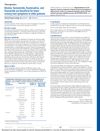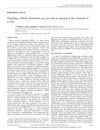 10 citations,
May 2018 in “Neuropharmacology”
10 citations,
May 2018 in “Neuropharmacology” Drugs for hormone-related conditions might help treat mental disorders but could have serious side effects.
 October 2015 in “Annals of Internal Medicine”
October 2015 in “Annals of Internal Medicine” Dutasteride, fesoterodine, and finasteride help older patients with urinary issues.
 20 citations,
August 2018 in “The World Journal of Men's Health”
20 citations,
August 2018 in “The World Journal of Men's Health” Finasteride may increase erectile dysfunction risk in patients with benign prostatic hyperplasia.
 October 2015 in “Elsevier eBooks”
October 2015 in “Elsevier eBooks” Finasteride helps hair growth and prostate issues but may cause sexual side effects and increase tumor risk.
 187 citations,
January 1994 in “The New England Journal of Medicine”
187 citations,
January 1994 in “The New England Journal of Medicine” Finasteride treats enlarged prostate and may help with baldness, but effects on sexual function and male fetuses are unclear.
 139 citations,
June 2003 in “Journal of Investigative Dermatology Symposium Proceedings”
139 citations,
June 2003 in “Journal of Investigative Dermatology Symposium Proceedings” Androgenetic alopecia in women needs more research and better management strategies.
 20 citations,
June 2017 in “Hormone Molecular Biology and Clinical Investigation”
20 citations,
June 2017 in “Hormone Molecular Biology and Clinical Investigation” Long-term use of dutasteride for enlarged prostate may worsen blood sugar, cholesterol, and erectile dysfunction.
 1707 citations,
December 2003 in “The New England Journal of Medicine”
1707 citations,
December 2003 in “The New England Journal of Medicine” Combination therapy of doxazosin and finasteride safely and effectively reduces benign prostatic hyperplasia progression risk.
 51 citations,
October 2002 in “European journal of endocrinology”
51 citations,
October 2002 in “European journal of endocrinology” Low-dose finasteride effectively treats hirsutism, is safe, and cost-effective.
 34 citations,
January 1998 in “European Urology”
34 citations,
January 1998 in “European Urology” Finasteride works best in 6 months and lasts 6 years.
 9 citations,
February 2018 in “Journal of Pharmaceutical and Biomedical Analysis”
9 citations,
February 2018 in “Journal of Pharmaceutical and Biomedical Analysis” Quick, selective detection of tadalafil and finasteride in human plasma developed.
 3 citations,
January 2019 in “Therapeutic advances in urology”
3 citations,
January 2019 in “Therapeutic advances in urology” WS PRO 160 I 120 mg effectively treats urinary symptoms from BPH with good safety and tolerability.
 2 citations,
March 2019 in “American journal of physiology. Renal physiology./American journal of physiology. Renal physiology”
2 citations,
March 2019 in “American journal of physiology. Renal physiology./American journal of physiology. Renal physiology” New treatments targeting fibrosis could improve urinary symptoms in BPH.
 195 citations,
May 2003 in “Obstetrics and gynecology (New York. 1953. Online)/Obstetrics and gynecology”
195 citations,
May 2003 in “Obstetrics and gynecology (New York. 1953. Online)/Obstetrics and gynecology” Most women with excess hair growth have an underlying hormonal issue, often treated with medication and hair removal methods.
 76 citations,
December 2009 in “Clinics in Dermatology”
76 citations,
December 2009 in “Clinics in Dermatology” Hormonal treatments can help with acne but are not the first choice due to side effects and the need for careful patient selection.
 71 citations,
January 2004 in “Dermatology”
71 citations,
January 2004 in “Dermatology” Oral finasteride works better than topical minoxidil for hair growth, both are safe.
 69 citations,
July 2015 in “Pharmacotherapy”
69 citations,
July 2015 in “Pharmacotherapy” Low-dose finasteride may cause lasting sexual dysfunction and suicidal thoughts in young men.
 52 citations,
June 1999 in “Endocrinology and Metabolism Clinics of North America”
52 citations,
June 1999 in “Endocrinology and Metabolism Clinics of North America” Antiandrogen treatments combined with oral contraceptives can help manage hair growth and hair loss in women with PCOS.
 32 citations,
September 2018 in “Clinical Obstetrics and Gynecology”
32 citations,
September 2018 in “Clinical Obstetrics and Gynecology” Hormone therapy for transgender females increases the risk of blood clots and requires careful dosing, monitoring, and lifelong management.
 30 citations,
April 1997 in “European journal of endocrinology”
30 citations,
April 1997 in “European journal of endocrinology” The document concludes that managing hirsutism involves identifying the cause, using a scoring system for severity, combining cosmetic and medical treatments, encouraging weight loss, and providing psychological support, while noting the need for more research on drug treatments.
 24 citations,
January 2001 in “Dermatologic clinics”
24 citations,
January 2001 in “Dermatologic clinics” Hormonal therapy is a treatment option for acne, the only medical treatment for hirsutism, and the most promising for androgenetic alopecia.
 21 citations,
July 2014 in “Clinics in Dermatology”
21 citations,
July 2014 in “Clinics in Dermatology” Hormonal contraceptives can help treat acne by affecting sebum production and androgen levels.
 20 citations,
June 2015 in “Hormone Molecular Biology and Clinical Investigation”
20 citations,
June 2015 in “Hormone Molecular Biology and Clinical Investigation” Finasteride worsens erectile dysfunction and lowers testosterone in men with enlarged prostates, unlike tamsulosin.
 18 citations,
June 2010 in “Current medicinal chemistry”
18 citations,
June 2010 in “Current medicinal chemistry” Treating hirsutism in women often requires a mix of medications and cosmetic methods for best results.
 12 citations,
March 2017 in “Journal of obstetrics and gynaecology Canada”
12 citations,
March 2017 in “Journal of obstetrics and gynaecology Canada” Testosterone therapy can modestly improve sexual function in menopausal women but should be used cautiously and is not recommended for routine measurement in sexual dysfunction or hirsutism.
 12 citations,
January 2010 in “Pediatric Health”
12 citations,
January 2010 in “Pediatric Health” Early treatment and lifestyle changes are important for managing PCOS in young people to prevent long-term health issues.
 11 citations,
April 2013 in “Journal of Agricultural and Food Chemistry”
11 citations,
April 2013 in “Journal of Agricultural and Food Chemistry” Monascus helps prevent baldness, prostate issues, and may be a natural alternative to medications.
 11 citations,
May 2003 in “Obstetrics and gynecology (New York. 1953. Online)/Obstetrics and gynecology”
11 citations,
May 2003 in “Obstetrics and gynecology (New York. 1953. Online)/Obstetrics and gynecology” Hirsutism in women often indicates a hormonal imbalance and can be managed with a combination of hormonal treatments and hair removal methods.
 10 citations,
June 2010 in “Expert Opinion on Drug Metabolism & Toxicology”
10 citations,
June 2010 in “Expert Opinion on Drug Metabolism & Toxicology” Finasteride reduces prostate cancer risk but may increase high-grade cancer chances.
 8 citations,
October 1988 in “Clinics in Dermatology”
8 citations,
October 1988 in “Clinics in Dermatology” Current research explores hair growth drugs, while future research aims for personalized treatments.






























